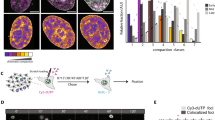Abstract.
In Escherichia coli, an interaction between the replication initiator DnaA and the sliding clamp protein, the β subunit (DnaN) of DNA polymerase III, is required to regulate the chromosomal replication cycle. We report here that colony formation by, and cell division of, the temperature (42°C)-sensitive dnaN59 mutant are inhibited at 34–35°C when DnaA is moderately (4-to 8-fold ) overexpressed, although chromosomal replication and the β subunit-dependent regulation of DnaA activity are not significantly inhibited. Immunoblotting analysis revealed that the β subunit is abundant (present at a level of about 5000 dimers per cell) at 34°C, and its concentration per unit cell volume was practically unaffected in the dnaN59 mutant by the overexpression of DnaA. The dnaN mutant cells that overexpress DnaA become filamentous at 34°C via an sfiA-independent pathway, different from that activated by the SOS response. This filamentation is accompanied by inhibition of nucleoid partition and FtsZ ring formation. In the dnaN59 mutant, oversupply of DnaA may disturb the coordinated action of cell cycle-regulating molecules, thus leading to the inhibition of these events.
Similar content being viewed by others
Author information
Authors and Affiliations
Additional information
Electronic Publication
Rights and permissions
About this article
Cite this article
Kawakami, .H., Iwura, .T., Takata, .M. et al. Arrest of cell division and nucleoid partition by genetic alterations in the sliding clamp of the replicase and in DnaA. Mol Gen Genomics 266, 167–179 (2001). https://doi.org/10.1007/s004380100546
Received:
Accepted:
Issue Date:
DOI: https://doi.org/10.1007/s004380100546




